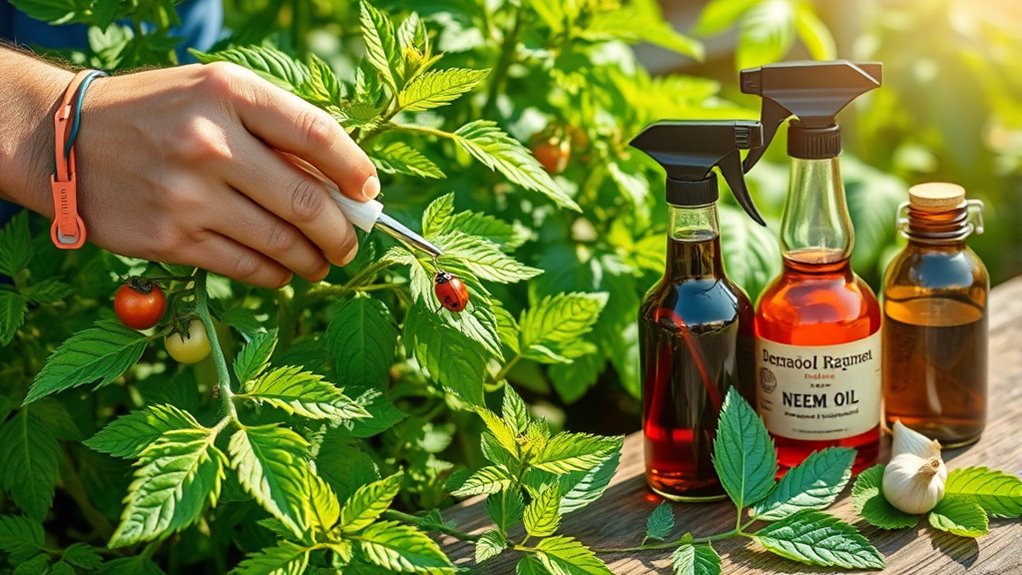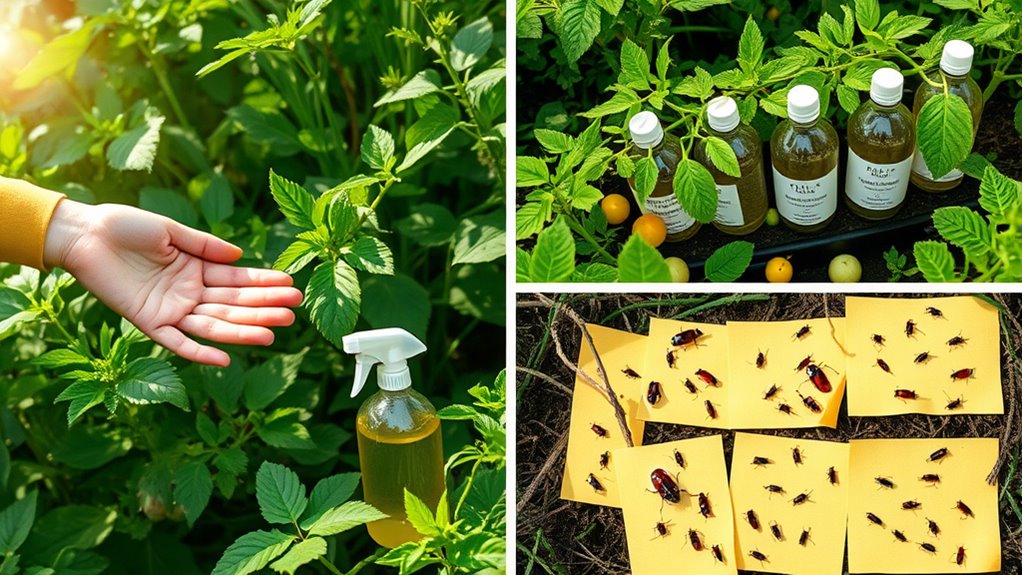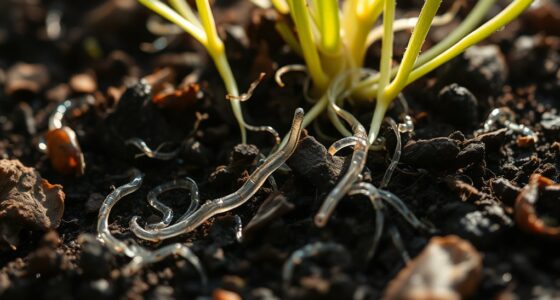You can effectively control pests organically by attracting beneficial insects like ladybugs and lacewings, applying homemade repellents such as neem oil or garlic spray, using physical barriers like row covers and sticky traps, improving soil health with composting, and practicing crop rotation. Regular monitoring helps you catch infestations early so you can act quickly with natural solutions. Consistently combining these methods creates a healthy, pest-resistant garden—discover more ways to keep pests at bay naturally.
Key Takeaways
- Encourage beneficial insects like ladybugs and lacewings by planting nectar-rich flowers to naturally control pests.
- Use natural repellents such as neem oil, garlic spray, and hot pepper solutions to deter pests effectively.
- Install physical barriers like row covers, sticky traps, and copper tapes to prevent pest access.
- Maintain healthy soil through composting and crop rotation to boost plant resilience against pests.
- Regularly monitor plants for early pest detection to enable prompt, organic intervention before infestations worsen.

If you’re looking for eco-friendly ways to protect your garden, organic pest control methods offer effective solutions without harmful chemicals. One of the most natural and sustainable approaches involves harnessing beneficial insects. These helpful bugs, such as ladybugs, lacewings, and predatory beetles, naturally prey on common garden pests like aphids, mites, and caterpillars. By encouraging their presence, you create a balanced ecosystem that keeps pest populations in check without resorting to synthetic pesticides. To attract beneficial insects, plant a variety of flowering plants, herbs, and native species that provide nectar and pollen. Avoid broad-spectrum insecticides, which can kill off these helpful insects along with pests, and instead focus on targeted interventions that support their survival.
Encourage beneficial insects to naturally control pests and maintain a healthy garden ecosystem.
Natural repellents also play a *crucial* role in organic pest control. You can make or buy plant-based sprays that deter pests without harming your plants or the environment. For example, neem oil, garlic spray, and hot pepper solutions serve as effective natural repellents. These substances disrupt pest feeding or reproduction, reducing infestations without chemicals. Applying these repellents directly onto affected plants or as preventive treatments can *significantly* diminish pest activity. Keep in mind that consistency is key—reapply after rain or every few days during peak pest seasons to maintain their efficacy.
Another strategy involves creating physical barriers that prevent pests from reaching your plants. Row covers, copper tapes, and sticky traps act as shields, reducing the need for chemical interventions. When combined with beneficial insects and natural repellents, these barriers form a *comprehensive* organic pest management system. Maintaining healthy soil through composting and crop rotation also boosts plant resilience, making them less attractive or vulnerable to pests.
Monitoring your garden regularly is *vital*. Early detection allows you to act swiftly with organic methods before infestations become severe. Look for signs of pests or damage, and identify the specific pests involved to choose the most effective natural control options. Over time, you’ll learn which beneficial insects thrive in your garden and how to attract them consistently.
Frequently Asked Questions
Are Organic Pest Control Methods Safe for Children and Pets?
You might wonder if organic pest control methods are safe for children and pets. Generally, they pose fewer safety concerns than chemical alternatives, reducing worries about chemical exposure. However, it’s still important to read labels and follow instructions carefully, as some natural ingredients can cause irritation. Always keep children and pets away during application and until the area is safe, ensuring you minimize any potential risks.
How Long Does It Take for Organic Methods to Show Results?
Think of organic pest control like a gentle rain nourishing your garden; results don’t appear overnight. Timing expectations vary, but usually, you’ll start noticing visible signs of progress within a few days to a couple of weeks. Patience is key, as these methods work steadily, building a natural defense. Stay consistent, and soon you’ll see pests retreating, replaced by healthier, thriving plants.
Can Organic Pest Control Be Used on Vegetable Gardens?
Yes, you can definitely use organic pest control on your vegetable garden. Applying compost tea boosts your plants’ immunity, while releasing beneficial insects like ladybugs helps naturally reduce pest populations. These methods are safe, eco-friendly, and effective when used consistently. You’ll notice fewer pests and healthier plants over time, creating a thriving garden environment without relying on harsh chemicals. Organic pest control truly supports sustainable gardening practices.
Are Organic Methods Effective Against All Types of Pests?
Imagine a garden under siege by pest species, each with its own defenses. You wonder if organic effectiveness can match chemical solutions. The truth is, organic methods do work on many pest species, but their effectiveness varies. Some pests are more resistant, making integrated approaches essential. While organic pest control offers eco-friendly benefits, you should stay vigilant, adapt strategies, and expect occasional challenges in keeping all pests at bay.
Do Organic Pest Control Solutions Need Frequent Reapplication?
You might wonder about reapplication frequency for organic solutions. Generally, organic pest control methods don’t last as long as chemical ones, so you’ll need more frequent reapplications. The longevity of these solutions depends on factors like weather, pest pressure, and application accuracy. To keep pests at bay, monitor your plants regularly and reapply as needed, usually every few days to a week, ensuring continuous protection without overuse.
Conclusion
By trying these organic pest control methods, you’re putting up a strong shield around your garden without relying on harsh chemicals. Think of your garden as a delicate dance floor—each natural method is a step that keeps pests at bay while letting your plants thrive. With patience and persistence, you’ll see your garden flourish like a well-tuned symphony. Keep nurturing it naturally, and watch as pests become nothing but a fleeting shadow in your thriving oasis.









